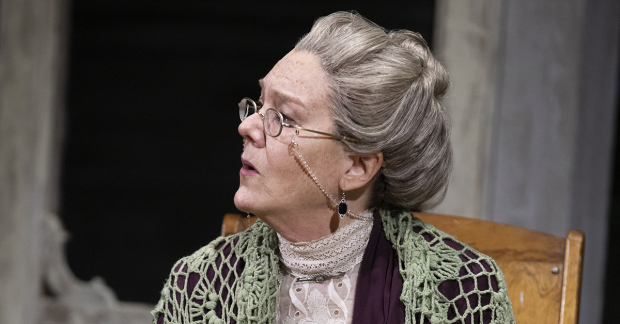Interview: Mary Badham Returns to To Kill a Mockingbird, 60 Years Later
Badham, who earned an Oscar nomination at age 10 for playing Scout onscreen, is now the racist Mrs. Dubose in the ongoing national tour.
Mary Badham played Scout in the beloved movie of Harper Lee's To Kill a Mockingbird and was nominated for an Academy Award at the age of 10. Now, 60 years later, she has returned to the property, but in a much different role. In the national tour of Aaron Sorkin's stage adaptation, Badham is playing Mrs. Dubose, the mean, old bigot next door.
Taking on the role of the "monster" is a harder part for Badham, who considers herself passionately liberal and intensely political. Our conversation, by phone during the production's Philadelphia tour stop, revealed how deeply concerned she is that "the world is going backwards to the 1930s," the era when the Mockingbird story takes place.
Fiercely opposed to racism and bigotry, Badham spoke about the show's mission to fight intolerance everywhere and how Lee's novel has formed her life's work.

(© Julieta Cervantes)
This conversation has been condensed and edited for clarity.
You began your acting career at such a young age, and then you put acting aside as an adult. Was answering a cattle call and winning the chance to play opposite Gregory Peck a dream come true, or was there a shift?
Originally, I wanted to be a large-animal veterinarian. My horse got sick with a rare disease, and I took him to the vet college for medical research. While I was there, I went to speak to the dean, to ask about enrolling, and was told, basically, no girls.
[After Mockingbird] I left Alabama when I was 14, refusing to go to the finishing school my father had in mind for me. Instead, with the help of an aunt, I moved to Los Angeles and discovered the fresh air of liberal California where I had friends of all colors and creeds with never a problem. Returning to Alabama was a shock: I realized I couldn't live there.
Your conversational speech has barely a trace of a Southern drawl, despite your Birmingham roots. Did you deliberately lose the accent?
I did. And I have a terrible time understanding old friends on the phone when my first name becomes at least four syllables long: Maaayeree.
Growing up in the Alabama, did you have experiences like the ones in Lee's novel?
My great-great-grandfather was a small town country lawyer in Arkansas, much like Atticus Finch. And much like Atticus, he took on a case similar to the one in Harper Lee's novel. The Ku Klux Klan rode to his house one night, threatening to burn it down unless he dropped the case. When he called each hooded man by name, having recognized the nags they rode on, they all went home.
A young, Black boy always delivered groceries to our house. The house was at the top of a steep hill, and it was July; it was hot, and he was drenched with sweat. I invited him in to cool off and have some freshly baked cookies made by Bidi, our Calpurnia. Later I was scolded by my mother for violating social standards. Then I had to face my father, a realist who had to tolerate members of the KKK as business associates. "Darlin'," he said to me, "your heart is in the right place, but you''re not in California anymore."
Is To Kill a Mockingbird as relevant today as it was when Harper Lee first put pen to paper?
To Kill a Mockingbird is as pertinent today as it ever was, and this production includes every current social issue. Besides the obvious racism, it addresses disabilities, mental illness, domestic abuse.
How does it feel to play Mrs. Dubose, a character so opposed to your own values?
When I was offered the Mrs. Dubose part, I went to my Black friends and asked their advice, knowing how hard it would be to say words I hated. My friends said, "Go for it." This is my job in life.
I just say the words. I don't let them into my soul. I have to detach myself from the character so as not to be in tears, although many of us in the cast are often upset. The tour hasn't yet played in Southern cities, but we're on our way.










